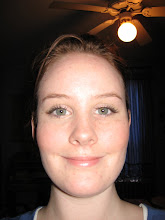Visiting the Holocaust Memorial Centre reminded me a story my Intro to European History professor told us right before his lecture on World War II. He told us that he used to assume that everyone knew the basics about the war, and certainly the end result, and as such he had been in the habit of skimming the topic. That is until one student wrote on the final exam that the Nazis had invaded the Soviet Union to depose Hitler and end the war. The student could well have been from a country where European history is not common knowledge, or could have been drunk from a kegger the previous night. My prof's assumption was that WWII and the Holocaust are no longer topics that all his students will know about, or understand. Elie Wiesel's quote over the entrance to the Memorial's exhibit reads: "Not to transmit an experience is to betray it." The museum does a very solid job of explaining and commemorating the Holocaust.
The first text panel provides visitors with a concise definition of the Holocaust. The facts and the emotional context are there, but only for the Jewish experience. The text speaks of the Jews' "often hopeless attempts to resist while their neighbors watched and the world stood by." I am worried that the museum will ignore the Holocaust's many other victims, but thankfully other peoples whom the Nazis considered undesirable are indeed mentioned throughout the exhibit.
The museum does an excellent job in providing visitors with context and background information. The first section deals with Jewish life before the Holocaust including Judaism and the Jewish experience in different countries, and rituals, religion, and customs. The displays establish what will be the Jews saving grace during the Nazi regime: the ability to build autonomous communities in the face of their outsider status. The context for the Holocaust begins with a detailed look at World War I and the building racial tensions and anti-Jewish sentiment in Germany. "In the end, however, the treaty that ended this war would prove to be a first step toward the next."
The exhibit does more than provide the straightforward textbook facts and I learned several interesting things that I didn't in school. Despite antisemitism, between 1901 and 1933, eleven Nobel Peace Prize winners were Jewish. Information such as this is part of a larger project of fighting stereotypes and highlighting Jewish contributions. In addition, I had no idea that China was a haven for Jews. I knew that despite wanting them to leave the Germans made it extremely difficult for them to do so. What I didn't know was that Shanghai didn't require a visa.
The exhibit makes no bones about who helped and who didn't. Canada's inaction is brought up repeatedly as is Canadian antisemitism in public signs that read "No Dogs or Jews Allowed." As I've probably mentioned I think my high school Canadian history course was woefully lacking in both breadth and scope. I've applied for many jobs recently that have a Canadian history focus. As with the books that I've been reading to re-learn Canadian history, the Holocaust Memorial works because it presents an exhaustive history, tells us stories that conventional histories miss, and forces us to be critical about things that hit close to home.
Part of the importance of a Holocaust memorial is that seeing is believing. We know that the Holocaust happened, but seeing the objects helps visualize how and what happened. In Aushwitz it was a large glass display case full of human hair that did it for me. A display with a family board game provided my "ah ha" moment in Montreal. The game, where one scores points by chasing the Jews out of Germany, shows the extent of propaganda and indoctrination. However, a big part of a Holocaust memorial or a museum of conscience is its powerful emotional message. The Montreal memorial has the context and some powerful displays, but I didn't experience any of the heart-string tugging never again type of moments that other similar sites induce.
22 down. 10 to go.
Subscribe to:
Post Comments (Atom)

No comments:
Post a Comment